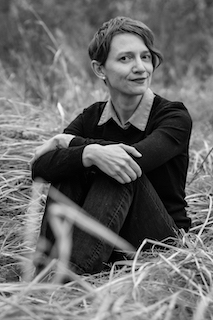Future History of Earth’s Birds
—after Alexander Lumans and Jennifer Ackerman
Among them, a common language of alarm.
Also, rapture.
Know that when zebra finches felt the first pinch
of climate change, they chirped to their offspring, still shelled,
to warn, to insist, they hatch
smaller and fiercer.
Dawn’s chorus is a peace-making operation.
The birds with the biggest eyes sing first.
Thus light
is the first part of song.
Some birds create barriers
of pinging notes—golden bells dangling
in the air, alarms and warnings. Does it matter
what kind of birds did this? They’re all dead now.
In bird language, there’s a call for mobbing, a call for fleeing.
To avoid danger, sometimes you must approach it.
In the shell, a bird recognizes its parents’ voices.
In love, mates sing duets they invent together.
On death, the survivor must learn a new tune.
There are such things as universal truths.
Some kites drop fire onto the earth to scare
up dinner. Some kites,
dropping fire, taught humans their first warm meal.
Neither ice nor snow lived long enough
to hear the last bird sing—just wind,
which carried those notes as far as it could
before they slipped from its palms—
There is a common language of alarm.
Copyright © 2025 by Amie Whittemore. Originally published in Poem-a-Day on May 11, 2025, by the Academy of American Poets.
“This poem arose from a confluence of influences: I had been reading Jennifer Ackerman’s The Genius of Birds when my friend, Alexander Lumans, published a story called ‘The Future History of the Arctic’ in Fractured Lit. I saw that by borrowing from its titling structure, I could envision a poem that celebrated the wild wisdom of birds while also mourning their diminishing numbers.”
—Amie Whittemore

